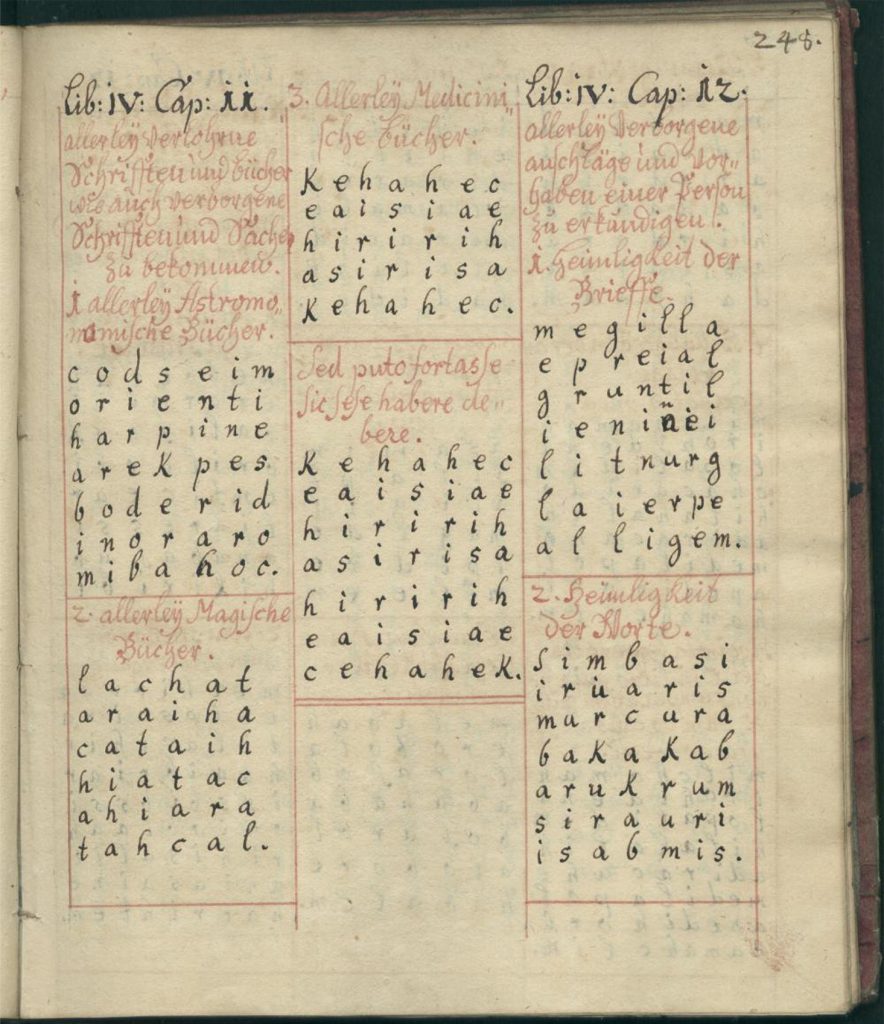Book of Abramelin

The Book of Abramelin tells the story of an Egyptian mage named Abraham, or Abra-Melin, who taught a system of magic to Abraham of Worms, a Jew in Worms, Germany, presumed to have lived from c. 1362–c. 1458.
The system of magic from this book regained popularity in the 19th and 20th centuries partly due to Samuel Liddell MacGregor Mathers' translation, The Book of the Sacred Magic of Abramelin the Mage.
Content
The grimoire is framed as a sort of epistolary novel or autobiography in which Abraham of Worms describes his journey from Germany to Egypt and reveals Abramelin's magical and Kabbalistic secrets to his son Lamech. Internally the text dates itself to the year 1458.
The story involves Abraham of Worms passing his magical and Kabbalistic secrets on to his son and tells how he acquired his knowledge. Abraham recounts how he found Abramelin the Mage living in the desert outside an Egyptian town, Arachi or Araki, which borders the Nile. Abramelin's home sat atop a small hill surrounded by trees. He was an Egyptian mage and taught a powerful form of Kabbalistic magic to Abraham. He was a "venerable aged man", and very courteous and kind. He discussed nothing but "the Fear of God", the importance of leading a well-regulated life, and the evils of the "acquisition of riches and goods".
Abramelin extracted a promise from Abraham that he would give up his "false dogmas" and live "in the Way and Law of the Lord." He then gave Abraham two manuscript books to copy for himself, asking for ten gold florins, which he took with the intention of distributing to seventy-two poor persons in Arachi. Upon his return fifteen days later, after having disposed of the payment money, Abramelin extracted an oath from Abraham to "serve and fear" the Lord, and to "live and die in His most Holy Law." After this, Abramelin gave Abraham the "Divine Science" and "True Magic" embedded within the two manuscripts, which he was to follow and give to only those whom he knew well.
Manuscripts
The book exists in the form of twelve manuscripts and an early printed edition. The provenance of the text has not been definitively identified. The earliest manuscripts are two versions that date from about 1608, are written in German and are now found in Wolfenbüttel. Another two manuscripts are in Dresden, and date from about 1700 and 1750 respectively.
The first printed version, also in German, dates to 1725 and was printed in Cologne by Peter Hammer. A partial copy in Hebrew is found in the Bodleian Library in Oxford, and dates from around 1740. An 18th century manuscript copy exists in French in the Bibliothèque de l'Arsenal in Paris. Another 17th-century manuscript in Italian exists in the 'Legato Martinengo' of the Queriniana Library in Brescia, Italy. It was part of the collection of the Count and Qabbalist Leopardo Martinengo of Barco and Torre Pallavicina. The manuscript, unknown for centuries to international researchers until 2009, has been found by academic researcher Maria Elena Loda in the esoteric section. At the moment, it is the only known manuscript translation in the Italian language of the Abramelin grimoire.
All German copies of the text consist of four books: an autobiographical account of the travels of Abraham of Worms to Egypt, a book of assorted materials from the corpus of the practical Kabbalah (including some which is duplicated in the German-Jewish grimoire called The Sixth and 7th Books of Moses) and the two books of magic given by Abramelin to Abraham. The well-known English translation by S.L. MacGregor Mathers from the French Manuscript in Paris contains only three of the four books. The Hebrew version in Oxford is limited to Book One, without reference to the further books.
Of all the extant sources, the German manuscripts in Wolfenbüttel and Dresden are taken by scholars to be the authoritative texts. According to respected Kabbalah scholar Gershom Scholem, the Hebrew version in Oxford was translated into Hebrew from German. An analysis of the spelling and language usage in the French manuscript indicates that it dates to the 18th century and that it was also likely copied from a German original. Although the author quotes from the Jewish Book of Psalms, the version given is not from the Hebrew; rather, it is from the Latin Vulgate, a translation of the Bible employed by Roman Catholics at that time.